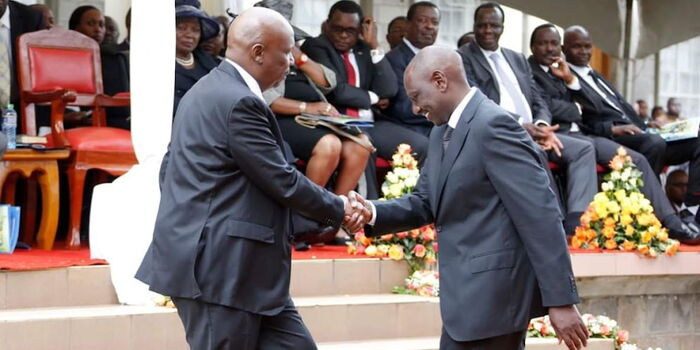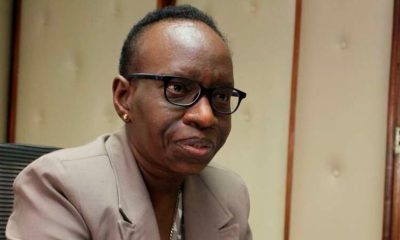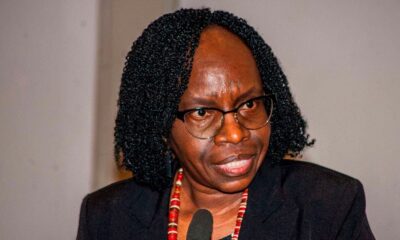Politics
Ruto, Gideon Moi in Secret State House Talks Over Baringo Race

President seeks to neutralize political threat as Kanu chairman makes comeback bid in crucial by-election
President William Ruto has opened secret negotiations with Kanu Chairman Gideon Moi in a bid to persuade him to abandon his senatorial ambitions in the high-stakes Baringo by-election set for November 27.
The two political heavyweights held an unexpected meeting at State House on Wednesday, their first substantive engagement since the 2022 General Election when the President’s United Democratic Alliance demolished Kanu’s decades-long grip on the Rift Valley region.
The talks, which have sent ripples across the political landscape, centered on the upcoming Baringo Senate race and the struggling fortunes of the Moi family’s business empire under the current administration.
Multiple sources with knowledge of the deliberations have revealed that the meeting was far from cordial consensus building but rather a tense negotiation between two men locked in a battle for regional supremacy.
According to Kanu insiders who spoke to Kenya Insights on condition of anonymity, Gideon Moi resisted the President’s overtures to step aside in favor of UDA’s Kiprono Cheburet, who won the ruling party’s nomination last month.
The former Baringo Senator, accompanied by Kanu Secretary General George Wainaina and former Baringo Woman Representative Gladwell Cheruiyot, is said to have politely but firmly declined the President’s request despite the personal appeal made within the imposing walls of State House.
However, officials from the presidency paint a different picture. Speaking off the record, they insist that Moi agreed to withdraw from the race but requested time to consult with other party officials before making a formal announcement.
“He has agreed to drop from the Baringo race,” one State House official told The Standard, suggesting that an announcement could be imminent.
The conflicting accounts underscore the delicate nature of the negotiations and the high political stakes involved.
That Gideon Moi agreed to meet the President at all, after years of maintaining a frosty distance, signals how advanced the talks have become and how seriously both sides are taking this electoral contest.
For President Ruto, the Baringo by-election has evolved from a routine succession exercise into a critical test of his political dominance in his own backyard.
The vote will fill the seat left vacant by the death of UDA’s William Cheptumo in February. In the 2022 election, Cheptumo had crushed Gideon Moi with 141,177 votes against the Kanu chairman’s 71,480, a humiliating defeat that seemed to signal the end of the Moi dynasty’s political relevance in the region.
But Gideon’s decision to mount a fresh challenge has rattled the ruling coalition.
Political analysts say the President fears that a loss, or even a narrow victory, would embolden his critics, particularly those aligned with former Deputy President Rigathi Gachagua, and raise questions about his control over the Rift Valley ahead of the 2027 elections.
Baringo holds deep symbolic significance for both men.
It is not just Gideon Moi’s political base but the birthplace of his late father, former President Daniel arap Moi, whose shadow still looms large over the county’s politics.
For the younger Moi, winning here would represent both personal redemption and proof that Kanu remains a force to be reckoned with despite its 2022 electoral massacre.
The timing of Gideon’s re-entry is strategic. Sources close to the Kanu chairman say he believes the ground has shifted since 2022.
There is growing discontent in parts of Baringo over the government’s handling of security operations, particularly the disarmament exercises that some communities feel have been carried out unfairly, leaving them vulnerable while neighboring groups remain armed.
Kanu officials insist their chairman is determined to fight to the end. “Chairman feels it is time to rebuild Kanu from the grassroots,” a senior party official told Kenya Insights.
“He believes that contesting and winning in Baringo will send a message that Kanu is still alive and that the Moi legacy endures.”
The former senator has already begun mobilizing support, holding strategy sessions and making donations to local groups.
Earlier this week, he donated Sh2.5 million to teachers in the county, a move seen as the opening salvo of his campaign.
This is not the first time the President has met with Gideon Moi since taking office.
Sources say the two leaders previously met briefly in Dubai when the Kanu chairman was traveling from the United States, but Wednesday’s State House meeting was their first formal engagement on Kenyan soil since the inauguration.
The invitation itself is telling. In Kenyan politics, a State House summons carries weight, and the President’s decision to personally engage Gideon Moi reveals the level of concern within the ruling coalition.
UDA strategists understand that a strong showing by Moi, even in defeat, would expose vulnerabilities in the President’s support base and provide ammunition to opposition forces gathering strength ahead of the next general election.
Political analyst Dismas Mokua argues that the outcome will reverberate beyond Baringo.
“If Moi performs strongly, it will expose vulnerabilities within UDA ahead of 2027. But if he loses by a big margin, it could mark the end of Kanu’s revival hopes and further cement Ruto’s dominance in the Rift Valley,” he said.
The Baringo race has already attracted intense interest from political observers who see it as a proxy battle between two competing visions for the Rift Valley.
On one side stands President Ruto’s UDA, a relatively young party that has positioned itself as the voice of the hustler generation and swept to power promising economic transformation.
On the other stands Kanu, Kenya’s oldest political party, trying to reclaim relevance by invoking the legacy of the Moi era.
As campaigns intensify, both sides are expected to deploy their most effective mobilizers to the county. For the President, retaining the seat is about more than numbers.
It is about maintaining the symbolism of unity and unwavering support in his home region. For Gideon Moi, the race represents a chance at political resurrection and an opportunity to prove that reports of Kanu’s death have been greatly exaggerated.
The President’s attempt to negotiate Gideon out of the race also speaks to a broader concern about the Moi family’s economic interests.
During the State House meeting, sources say discussions touched on the performance of Moi family businesses, which have reportedly faced challenges under the current administration. Whether economic considerations will ultimately influence Gideon’s political calculations remains to be seen.
What is clear is that the November 27 by-election has transcended local politics to become a defining moment for both the President and the Kanu chairman.
Gideon Moi’s refusal to immediately accede to the President’s request suggests he believes conditions on the ground favor a competitive race.
His silence since the meeting, including his failure to respond to media inquiries, indicates that negotiations may still be ongoing behind the scenes.
For now, the political chess match continues, with both players calculating their next moves.
The Standard has learned that pressure is mounting on Gideon Moi from various quarters to reach an accommodation with the government, but party insiders say the chairman is resolute. “He has made up his mind to run and he will run,” said one Kanu official.
As the campaign period officially begins, all eyes will be on Baringo.
The outcome will not only determine who represents the county in the Senate but will also serve as a barometer of the President’s political strength in his own backyard and offer clues about the shape of Rift Valley politics heading into the next electoral cycle.
Whether the secret State House talks will yield a political deal or simply mark the beginning of an intense electoral battle remains the question on everyone’s lips.
What is certain is that the fight for Baringo has become much more than a by-election. It is a contest for legacy, relevance and regional supremacy between two of Kenya’s most prominent political families.
Kenya Insights allows guest blogging, if you want to be published on Kenya’s most authoritative and accurate blog, have an expose, news TIPS, story angles, human interest stories, drop us an email on [email protected] or via Telegram
-

 Business7 days ago
Business7 days agobetPawa Empire Crumbles: Mr Eazi’s Betting Gambit Unravels Amid Partner’s Shadowy Deals
-

 News4 days ago
News4 days agoDCI Probes Meridian Equator Hospital After Botched Procedure That Killed a Lawyer
-

 Investigations2 weeks ago
Investigations2 weeks agoKERRA Homa Bay Region Manager Calvince Thomas Accused of Swindling Businessman Ksh 2 Million in Phantom Tender Deal
-

 Business1 week ago
Business1 week agoKRA Boss Humphrey Watanga In Big Trouble In Sh5.5 Billion Rice Import Scandal
-

 News6 days ago
News6 days agoAuditor-General Exposes Brazen Corruption at Kenya Roads Board, Sends Management into Panic
-

 Business6 days ago
Business6 days agoState Set to Demolish Pastor Ng’ang’a’s Church in Sh28 Billion Railway City Push
-

 Business3 days ago
Business3 days agoMinnesota Fraud, Rice Saga, Medical Equipment Deal: Why BBS Mall Owner Abdiweli Hassan is Becoming The Face of Controversial Somali Businessman in Nairobi
-

 Business2 weeks ago
Business2 weeks agoTreasury’s Sh40 Billion Safaricom Gamble Could Cost Kenya Trillions, Auditor Warns



















